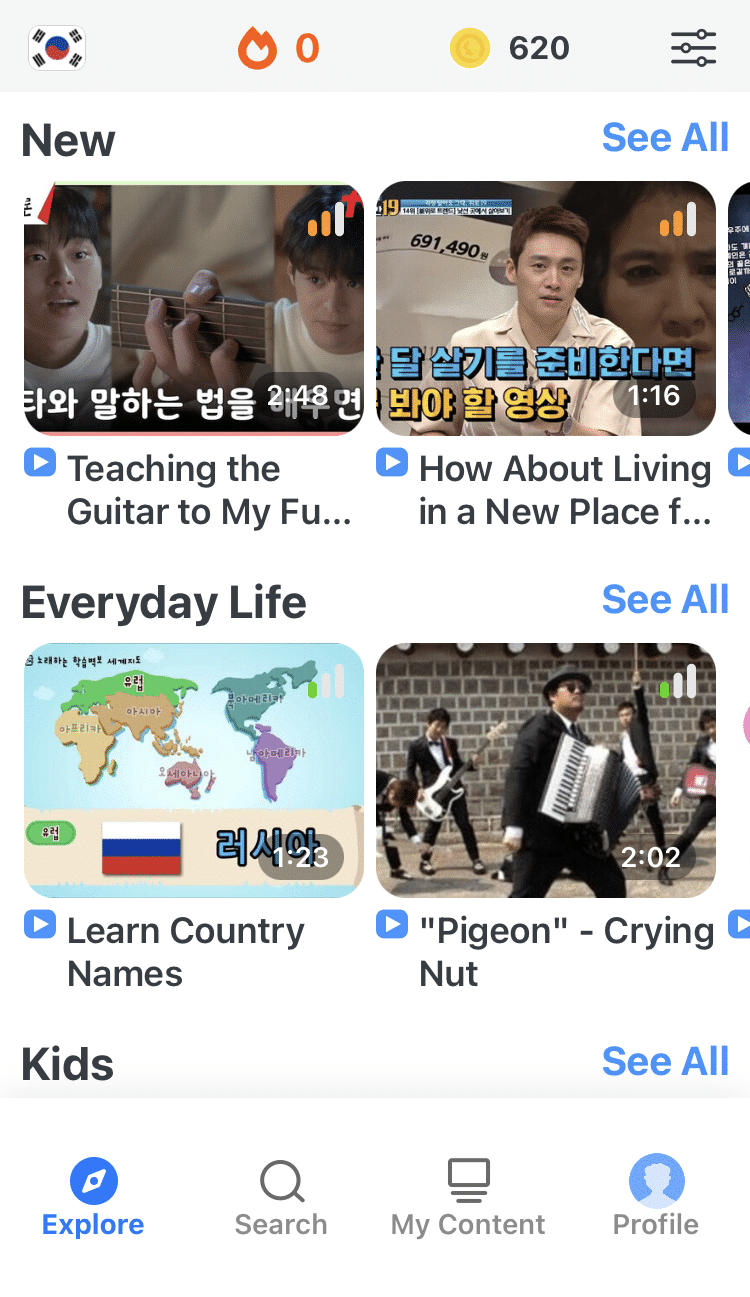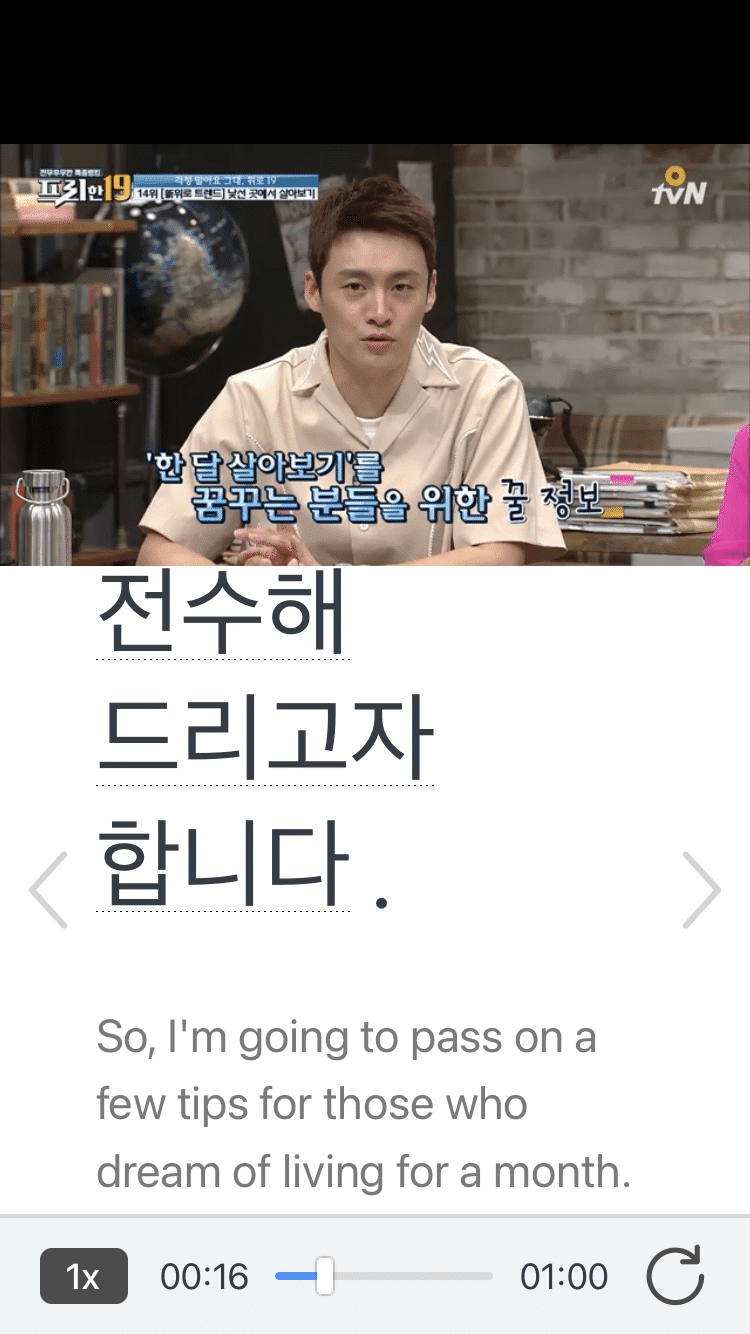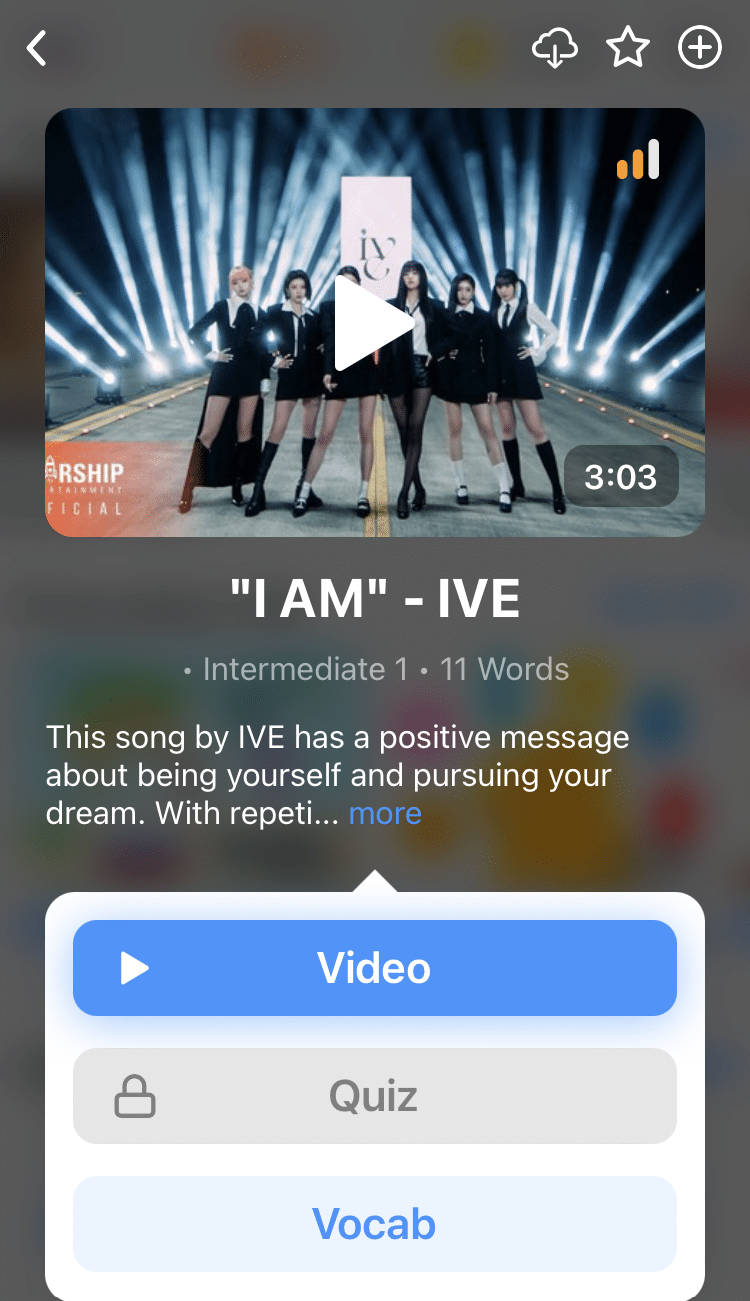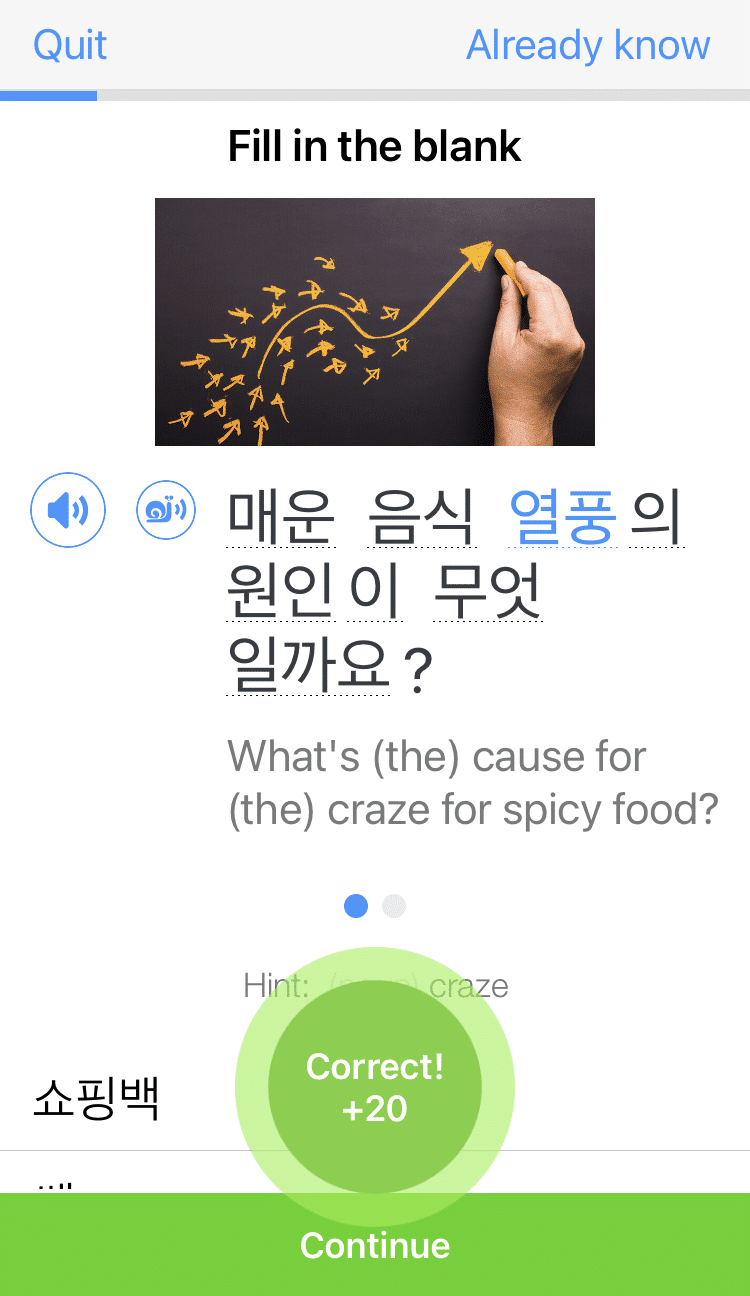
How to Flirt in Korean
If you ever find yourself in a situation where you want to flirt in Korean, it’s useful to have some key words and phrases up your sleeve to help you out.
Check out this guide to learn about what flirting is like in Korea, as well as some key expressions, compliments and more.
Contents
- A Guide to Flirting in Korea
- The Most Useful Expressions for Flirting in Korean
- 1. 라면 먹고 갈래? — Do you want to go eat ramen?
- 2. 커피 한잔 하고 갈래? — Do you want to grab a cup of coffee?
- 3. 핸드폰 번호가 뭐예요? — What’s your phone number?
- 4. 언제 다시 볼까요? — When can we meet again?
- 5. 함께 바다 보러 갑시다 — Let’s go see the sea together
- 6. 오늘 밤 내 꿈 꿔 — Dream of me tonight
- 7. 네 생각하느라 잠을 한숨도 못 잤어 — I couldn’t sleep because I was thinking of you
- 8. 오래전부터 알고 지낸 것처럼 마음이 편안하네요 — I feel like I’ve known you for a long time
- 9. 너 내꺼 할래? — You want to be mine?
- 10. 내 아를 낳아도! — Have my kids!
- More Phrases for Flirting in Korean
- Compliments in Korean
- And One More Thing...
Download: This blog post is available as a convenient and portable PDF that you can take anywhere. Click here to get a copy. (Download)
A Guide to Flirting in Korea
In Korean, flirting is known casually as 꼬시다 or 바람둥이 . But affection isn’t something that should be flaunted about in public in Korea.
If you kiss or intimately hug your partner on the streets, or liberally use any of the expressions listed in this post, you may find passersby giving you a sour stink-eye, a disapproving tongue click or a bemused look—if they’re not hurriedly scampering around you two with their heads ducked. Anything beyond hand-holding should be done either very covertly or fully away from the public eye.
Dating also isn’t seen as such a casual affair in South Korea. The act of dating is typically perceived to be something of long-lasting value and commitment.
When you do make the daring move from being friends to romantic partners, there’s one thing that’s considered vital for the transition: an actual verbal confession of love.
12 Ways to Say “I Love You” in Korean [with Audio] | FluentU Korean Blog
Say “I love you” in Korean with this guide! You might already know saranghae (사랑해), but we’ll show you more diverse ways to express your love, including when…
Sounds cheesy, but honesty is a well-loved policy in Korea. This blunt confession should be said before any of the more risqué flirting phrases described in this post.
Established couples can be quite obvious to spot. If they’re not salaciously holding and swinging hands while walking, they may be wearing matching clothes and accessories to show that they are indeed an item.
The Most Useful Expressions for Flirting in Korean
1. 라면 먹고 갈래? — Do you want to go eat ramen?
If you haven’t had Korean instant ramen, then you must try it. It’s a staple in Korean cuisine, and for good reason.
But this phrase isn’t about asking if someone wants to share a bowl of the delicious stuff.
No, in the world of flirting, this covert expression basically means “Do you want to stay over?”
It’s a sneaky one that can be interpreted innocuously more often than not. So, maybe you should make sure the person isn’t actually hungry for ramen.
2. 커피 한잔 하고 갈래? — Do you want to grab a cup of coffee?
This phrase suggests an invitation to return to one’s place and share a cup of coffee before parting ways, signaling a reluctance to separate and an interest in further connection.
It indicates a desire to prolong the moment and sustain the bond before parting.
Typically, in the progression from a casual relationship to something more serious, one individual may bravely take the initiative.
Fun fact: coffee is kind of a big deal in South Korea. Folks drink it anytime, anywhere.
FluentU takes authentic videos—like music videos, movie trailers, news and inspiring talks—and turns them into personalized language learning lessons.
You can try FluentU for free for 2 weeks. Check out the website or download the iOS app or Android app.
P.S. Click here to take advantage of our current sale! (Expires at the end of this month.)
3. 핸드폰 번호가 뭐예요? — What’s your phone number?
Korean people do love to be on their phones, so this isn’t such a bold question to ask. However, it all depends on context. If you ask a guy or gal for their phone number so that you can work on a school project together, that’s reasonable.
But if you ask directly after a first-time meeting or a maybe-a-date-maybe-not, the implication is clear.
Don’t go straight for voice or video calls, though. It’s likely that a Korean person would prefer text communication at first, especially on Kakaotalk.
So you should probably boost your knowledge of Korean text slang.
4. 언제 다시 볼까요? — When can we meet again?
Now, before you ask this question, make sure you both enjoyed your time together. Otherwise, you may not get any straightforward answer.
It doesn’t hurt to be a bit polite in your inquiry either, especially if you two haven’t known each other for very long.
That’s why adding a 요 at the end could be a nice touch.
5. 함께 바다 보러 갑시다 — Let’s go see the sea together
Because geographically speaking, few places are more romantic than a giant body of salty water.
This expression has been popularly used in K-dramas. It works well as a subtle date invitation that doesn’t necessarily have to happen at the sea.
The good news is, South Korea is a peninsula, so it shouldn’t be too hard to find some nice sandy shores to walk on.
I advise you to check the weather before you think of going during months of heavy rain (around July to August).
6. 오늘 밤 내 꿈 꿔 — Dream of me tonight
You had a wonderful evening together, and the soothing nighttime breeze and the lingering good mood has made you extra confident.
So, throw out this line and expect a healthy blush from your partner.
Many Korean folks place a lot of significance in dreams, so your presence within them can be seen as a rather impactful event.
7. 네 생각하느라 잠을 한숨도 못 잤어 — I couldn’t sleep because I was thinking of you
Perhaps he or she will appreciate the thought that it was they who caused your lack of slumber, as opposed to the standard insomnia or sleep paralysis.
Granted, this expression can come off as corny, but its ability to make one fluster is undeniable.
8. 오래전부터 알고 지낸 것처럼 마음이 편안하네요 — I feel like I’ve known you for a long time
마음이 편한 basically means “my mind is comfortable” or “my mind is at ease.” You’re suggesting that this special person makes you feel relaxed and cozy.
This timeless flirting cliché must be used with caution. You don’t want to say it too early in your interactions, because it’ll just sound fake and dishonest.
Say it too late in a relationship, and it’ll become more of a “duh” statement.
9. 너 내꺼 할래? — You want to be mine?
Being direct can be the best approach, and this is an especially daring phrase that you should use only if you and your partner are very comfortable with each other.
It should basically be established that you two are already an item, so it’s more like a question of expected confirmation.
10. 내 아를 낳아도! — Have my kids!
Well, this one doesn’t need much explanation. I also think you should really save it for a person who you’ve known for quite a while, or someone who has a good sense of humor.
You already know that the phrase isn’t really asking someone to give birth to a child, right?
In a comedy program, after it was mentioned that “I like you!” was expressed as “Have my kids!” in Gyeongsang dialect, it became a huge trend.
More Phrases for Flirting in Korean
As suave as the 10 expressions above are, you’re going to need more in your arsenal if they somehow don’t work as expected.
So here are some more tools to use at your discretion. To ramp up the charm, it’ll help to add some Korean terms of endearment when saying these phrases.
40 Korean Terms of Endearment for Your Loved Ones [with Audio] | FluentU Korean Blog
These Korean terms of endearment will impress your Korean loved ones—whether they’re your sweetheart, friend, child or family member. They’ll leave them feeling loved…
- 다시 만나고 싶어요 — I want to see you again
- 오늘 너와 함께 있고 싶어 — I want to be together with you
- 우리 해돋이 보러 갈래요? — Do you want to see the sunrise?
- 오늘 저녁으로 뭐 해 먹을 거예요? — What are you doing for dinner?
- 주말에 영화 보러 갈래요? — Do you want to see a movie this weekend?
- 우리 집이나 당신 집으로 갈까요? — Do you want to go to my place or yours?
- 러브샷 할래요? — Do you want to do a “love shot”? (a drinking shot)
- 오늘은 외롭네요. 저랑 같이 있어 줄래요? — I’m lonely today so can you be with me?
- 아침에 일어날 때마다, 당신이 제 곁에 있었으면 좋겠어요 — Every time I wake up in the morning, I wish you were there next to me
- 하루 종일 당신과 시간을 보낼 수 있어서 행복해요 — I’m happy spending all day with you
- 내 꿈에 찾아와 줘 — Come to my dreams
- 이런 감정 처음이야 — This is the first time I’ve felt like this
- 아프지 마! 걱정되니까 — Don’t get hurt/sick! I get worried
- 널 영원히 내 남자로 만들 거야 — I’m going to make you my man forever
- 다음에 또 만나고 싶어요 — I want to meet you again
- 보고 싶어서 일찍 왔어요 — I came early because I missed you
- 난 네가 자랑스러워 — I’m proud of you
- 난 너를 믿어 — I believe/trust you
- 난 너밖에 없어 — You’re the only one for me
- 헤어진 지 얼마 안 되었는데도 보고 싶어 — It hasn’t been long since we met up but I already miss you
- 하늘의 별이라도 따다 줄게 — I’ll pick and give to you the stars from the sky
- 이 세상 끝날 때까지 너와 함께하고 싶어 — I want to be together with you until my life ends
- 보고 싶다. 우리 만날까? — I miss you, Should we meet up?
- 같이 살고 싶어 — I want to live with you
Compliments in Korean
Flirting is fine, yes, but it can’t be all about coy, poetic schmoozing.
Sometimes a guy or gal just wants to hear a decent comment about themselves without the presence of waggling eyebrows and knowing smirks.
And no, a blunt “You look good” won’t always cut it. Let’s put a little more effort by trying out these compliments:
- 오늘 진짜 멋있어 — You’re gorgeous today
- 당신이 이 꽃보다 더 예뻐요 — You are prettier than a flower
- 눈이 사슴 눈 같아요 — Your eyes are like a deer’s
- 옷이 참 잘 어울리네요 — You look good in those clothes
- 너 정말 섹시해 — You’re sexy
- 내 이상형이야 — You’re my type
- 꽃미남이시네요 — You’re very handsome (for men)
- 미소 짓는 얼굴이 천사 같아요 — Your smiling face looks like an angel
- 너 매력적인 성격을 가지고 있어 — You have an appealing personality
- 정말 다정해요 — You are so sweet
- 너 몸매가 정말 좋아 — You have a great body
- 네 입술이 앵두 같아 — Your lips are like cherry
- 넌 다른 여자들하고는 달라 — You’re not like other girls
- 너는 최고야! — You’re the best!
- 너보다 더 중요한 게 어딨어? — Who could be more important to me than you?
There is indeed such a thing as flirting fluency. And hopefully, this post has helped you get closer to it (and improve your Korean skills in general)!
Download: This blog post is available as a convenient and portable PDF that you can take anywhere. Click here to get a copy. (Download)
And One More Thing...
If you enjoyed this post, you're already halfway to having the time of your life learning Korean with FluentU!
FluentU makes it possible to learn with K-pop videos, funny commercials, entertaining web series and more. Just a quick look will give you an idea of the variety of FluentU videos on offer:

FluentU really takes the grunt work out of learning languages, leaving you with nothing but engaging, effective and efficient learning. It's already hand-picked the best videos for you (which are organized by level and topic), so all you have to do is simply choose any video that strikes your fancy to get started.
Each word in the interactive captions comes with a definition, audio, image, example sentences and more.

Access a complete interactive transcript of every video under the Dialogue tab, and easily review words and phrases from the video under Vocab.

You can use FluentU’s unique Quiz Mode to learn the vocabulary and phrases from the video through fun questions.

FluentU keeps track of what you're learning, and tells you exactly when it's time for review, giving you a 100% personalized experience.
Review sessions use video context to help embed the words in your memory.
Start using the FluentU website on your computer or tablet or, better yet, download the FluentU app from the iTunes or Google Play store. Click here to take advantage of our current sale! (Expires at the end of this month.)




